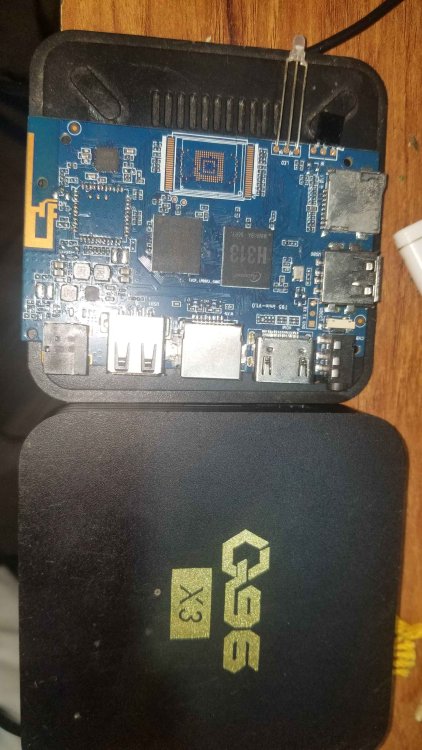All Activity
- Past hour
-

Rupa X88 Pro 13 - RK3528 board with images
Hqnicolas replied to fedes_gl's topic in Rockchip CPU Boxes
for Pi-Hole i'm using: "cbcrowe/pihole-unbound" https://hub.docker.com/r/cbcrowe/pihole-unbound For docker Containers I'm on Casa-OS curl -fsSL https://get.casaos.io | sudo bash pihole-unbound.yaml - Today
-
for thoses who want to install sd to emmc, use this script (remove the line about haos near the end)
-
everything is in the main post
-
No idea what causes this, will need to check on my device
-
What you are reporting is quite common with tv boxes. The case markings often are different than the internals. What is it you are looking for? Your post didn't really ask for anything other than to report that you got a common tv box with internals that differ from the case.
-

Need Kernel source for linux-image-current-sunxi64 6.12.20
ovacikar replied to ovacikar's topic in Orange Pi Zero 2
No, i gave up compiling on Armbian, i installed the debian bookworm server image provided by orangepi instead -

Unsupported kernel version while updating raspi-firmware on Debian 13
0jay replied to lovenemesis's topic in Raspberry Pi
I was having some pretty substantial problems with several different builds before developing this hold pattern, Werner -

Unsupported kernel version while updating raspi-firmware on Debian 13
Werner replied to lovenemesis's topic in Raspberry Pi
IIRC until like half a year ago this also worked just fine. I assume then this check was introduced upstream which caused this - more or less cosmetical - error. -
@JohnTheCoolingFan any clue?
-

Unsupported kernel version while updating raspi-firmware on Debian 13
0jay replied to lovenemesis's topic in Raspberry Pi
If I hold those packages I don't see any issues at all. -

Armbian_25.8.2_Orangepi5_noble_current_6.12.49.img.xz fails to boot
Werner replied to djtecha6's topic in Orange Pi 5
moved. All boards using rk3588/s soc most likely work best with either vendor or edge kernel. Current has limited functionality since when this kernel became LTS only basic support was there. All further enhancements regarding hardware featureless were upstreamed later. -

Unsupported kernel version while updating raspi-firmware on Debian 13
Werner replied to lovenemesis's topic in Raspberry Pi
I think there are some directories in /etc which contain initramfs pre/post scripts. I don't have hw on hand to check right now but I believe there was some script starting with z50- filename that contained this check and there should be a 2nd one from Armbian that actually does what the upstream script refuses to do. -
So there is some conflicting naming between the name of the unit and the name on the board revision code. The name of the unit would suggest that it's a X96-Q clone, but the revision number suggests that it's a T95 mini. Like as seen in this video
-

Rupa X88 Pro 13 - RK3528 board with images
fedes_gl replied to fedes_gl's topic in Rockchip CPU Boxes
Thanks! we hope this guy could get the time to do it, I will be here for every testing need ! 😁 I already installed Armbien on an orange Pi zero 3, and I'm running pihole on it. Works fantastic! At least this allows me have some experiencie with Armbian -
Hi @robertoj The stock mpv-0.40.0 from alarm-repo does not seem to support v4l2request so downloaded mpv-full-git with v4l2request from @junari (manjaro-arm user) https://drive.google.com/drive/folders/1hAr_PB52fIBcZOgtx2WoGghv63H1-JzB. Also downloaded the ffmpeg-v4l2request. Wtih the ffmpeg-v4l2request and mpv-full-git from @junari mpv vpu hardware acceleration works. Did not build/compile mpv-full-git (no experience in compliling/build packages in Linux) downloaded mpv-full-git. According to @jnuari, the mpv-full-git PKGBUILD: https://github.com/iuncuim/manjaro-h616/blob/main/mpv-v4l2request/PKGBUILD Hopefully you can modified this PKGBUILD to compile on Debian Trixie.
- Yesterday
-

How to install armbian in h618?
Алексей Торопов replied to alienxz77b's topic in Allwinner CPU Boxes
Are there any chances to enable i2c? I use the tv-box as a 3d printing server (klipper) openvfb is working fine, and I also managed to configure the G-Code Shell Command to display the remaining print time. I want to connect the g-sensor via the i2c bus, please tell me if possible. klipper@transpeed-8k618-t:~$ dmesg | grep i2c [ 1.374462] mv64xxx_i2c 5002c00.i2c: can't get pinctrl, bus recovery not supported [ 1.683314] axp20x-i2c 2-0036: AXP20x variant AXP313a found [ 1.683791] axp20x-i2c 2-0036: AXP20X driver loaded klipper@transpeed-8k618-t:~$ sudo /sbin/i2cdetect -l klipper@transpeed-8k618-t:~$ -
Now the issue is it doesn't want to boot from SD (eMMC unplugged). I bought a brand new µSD as a last resort but nothing. I get a fast double blink on the status LED. Tried Armbian_community_25.5.0-trunk.131_Rockpi-4a_bookworm_current_6.12.16_minimal and Armbian_community_25.11.0-trunk.273_Rockpi-4a_trixie_current_6.12.49_minimal. Where can I find old Armbian-supported builds ? Because I'm sure those work. I'll try the last supported build and report. (can't delete this post)
-
Experiencing the same issue, wifi fails to activate for about 4 out of 5 boots or so.
-
It sounds like you're much more familiar with Linux than I am... especially on a deep level. It does have its strengths. I am grateful that it's a working alternative to anything from Microsoft or Apple. But I'm a firm believer that whether hardware or software (or any kind of design), simpler is better. Complication only arises from lack of clarity and understanding. One of the hallmarks of a good operating system is to provide complete support and essentially get itself out of the way - to make the computer an immediately usable tool for what you intend to use it for.... to be a clear conduit for that intention.
-
Hi, TallMan, ...And here was me thinking I was all alone with my disillusionment of the way software has developed! I have to agree with most of your sentiments, with one exception. I have been a long time user of Linux (I stress user, as opposed to developer). This came about because more years ago than I care to remember, I worked for two major German companies on development of what was then known as Point-to-Multipoint communications, which later became the foundation for modern mobile phone network backbone communications. As part of this work, we had to carry out network planning for what are now the major phone network operators. Basically this consisted of predicting whether links would work under varying conditions (this was at frequencies up to 20 GHz). The tools we had to do this were the usual company Microsoft computer setups, satellite photographs of the area (in digital format), and a software tool written in Unix which used this data to predict lines of communication in 3 dimensions. This was my first experience of Unix, and it became a bit of a life-changer. Those of us who had to learn our way round it (as users), eventually all realised very quickly how much better/faster/more reliable it was than anything from anyone else, especially Microsoft. Of course, getting Unix for personal use at the time was not really on, but eventually Linus Torvalds produced Linux, and I for one never looked back. I'm well aware that users of Linux are regarded as nerds, and I'm happy with that, even if I try not to be one! As I got older, I eventually began to lose my interest in programming (another story!), but I am still a Linux user, and always will be. Its true it has its problems - but then all OS's have problems. In my opinion, sadly, these problems are not really the software as such - its almost always down to lack of information, or the proliferation of false and misleading information - after all, until recent years, developers set out with good intentions. Perhaps I can draw a parallel with my experiences in this thread using Armbian - While information and help does exist (Armbian documentation, for example), it is limited, and by no means comprehensive. It seems to be very difficult to make people understand that an OS is a tool, and should be usable, just like a screwdriver or a hammer, yet all too often the information to make productive use of the OS is simply not available. Instead, people like me rely on the good offices of people such as yourself - yet where would we be if the Internet didn't exist?. I do agree with you that even Linux is becoming 'overburdened' - but to some extent, that is one of its virtues - I have been able to make ancient computers run using Linux - Windows can't even make the transition from Windows 10 to Windows 11 unless the user buys a new machine. At least Linux has never declared good equipment obsolete, like Microsoft. It is easy for me to see a very close similarity between Armbian and Linux - I know this is intended, because of the Debian connection, so for people like me thats no bad thing. I can also see the attraction of RISC-V (probably too late for me to take it up), but one can hope these develop in a more organised, less monetised way than some OS's. Great to hear about the Commodore - a classic!. I still have my very first personal computers - a Sinclair Z80, which still works, although its keyboard has troubles. I got it around 1981, and it was one of the early self-assembly versions without a case. No-one was more surprised than me when the thing worked. Maybe I'll find another keyboard for it - I also have books giving its full ROM listing, and a circuit diagram, and 'advanced' programming - or BASIC in other words. Then I moved on to an Oric Atmos, produced in 1984 by Tangerine Computers (Shades of Orange!). It was a 'real' computer, with a proper keyboard, and used a Rockwell 6502. I did a lot of machine code programming on it, and very quickly changed the processor to a 65C02, which has a better, expanded instruction set. (in ths days, the 650s was often cited as having the first Reduced Instruction Set). I also still have it in working condition, plus a full ROM listing/circuit, and books on programming it (machine code). The BASIC it used was also very good. Later machines included a Dragon, Atari520 and some forgotten (perhaps for the best) . Like you the OPi is my first ARM device (actually given to me by a friend). I was interested in a Raspberry PI 5 (I have an old RasPi3), but they were so hard to get and expensive, I gave up. (I think the friend gave up on the OPi, which was why I ended up with it)! I also would have like to have seen most modern OS's lead to development of better systems, but I guess it won't happen in my lifetime, but at least I can support work on things like ARM and RISC-V. Incidentally, did you see that Qualcom won a case brought against them by ARM because techniques developed by ARM were allegedly used by Qualcom in their mobile phone processors? - probably not a good thing for ARM. And finally...I'm still stuck with this confounded stray icon on my Armbian installation, so another night searching for it.I 'm quite impressed otherwise - it seems very fast and efficient, (compared to my Ryzen7 Desktop machine) so I'll keep at it - It has most of the software on it that I need for now, so its definitely usable. I know about the hidden and system folders in Linux, and they are fairly easy to access in Linux Mint, but a search doesn't throw it up (yet) - I'll keep trying. Thanks for the Help, Keith




